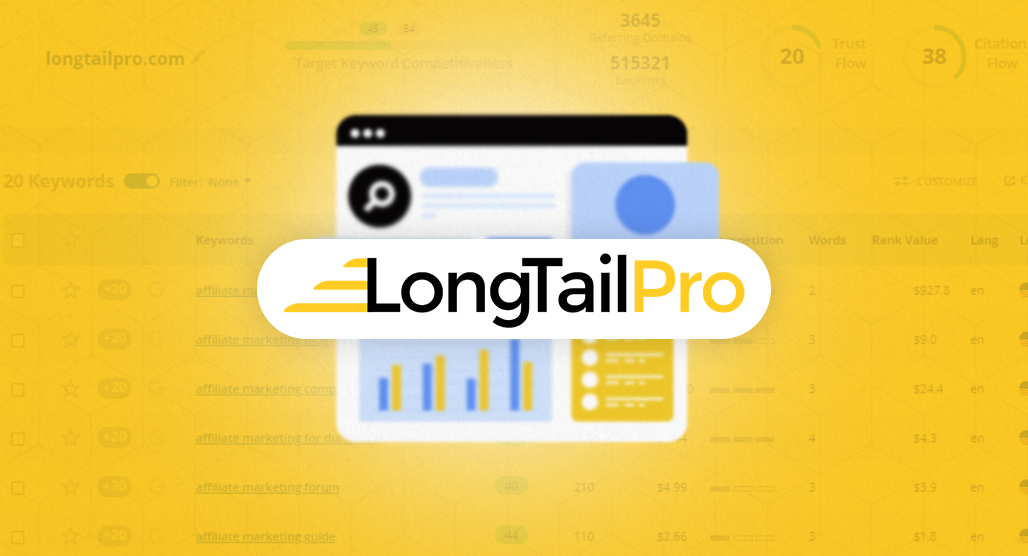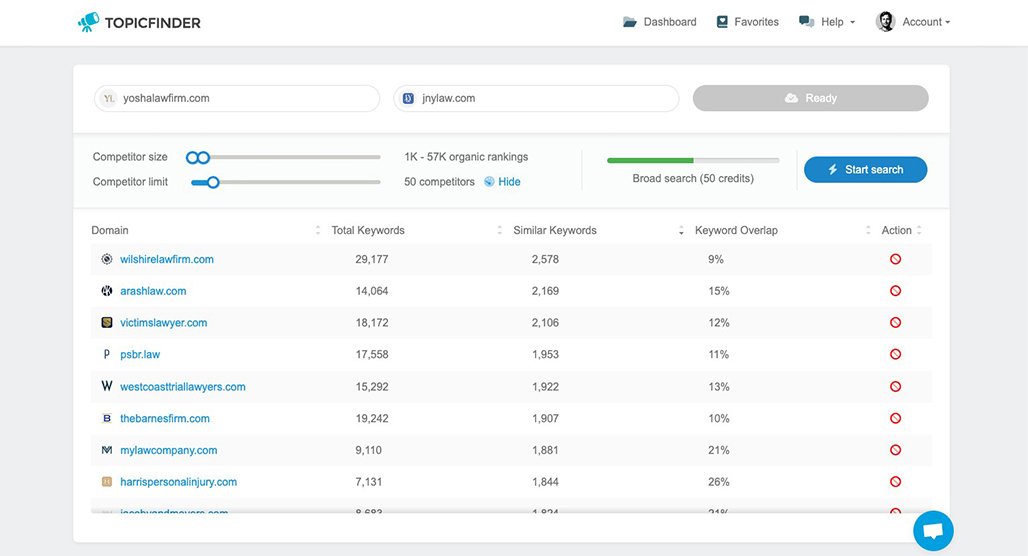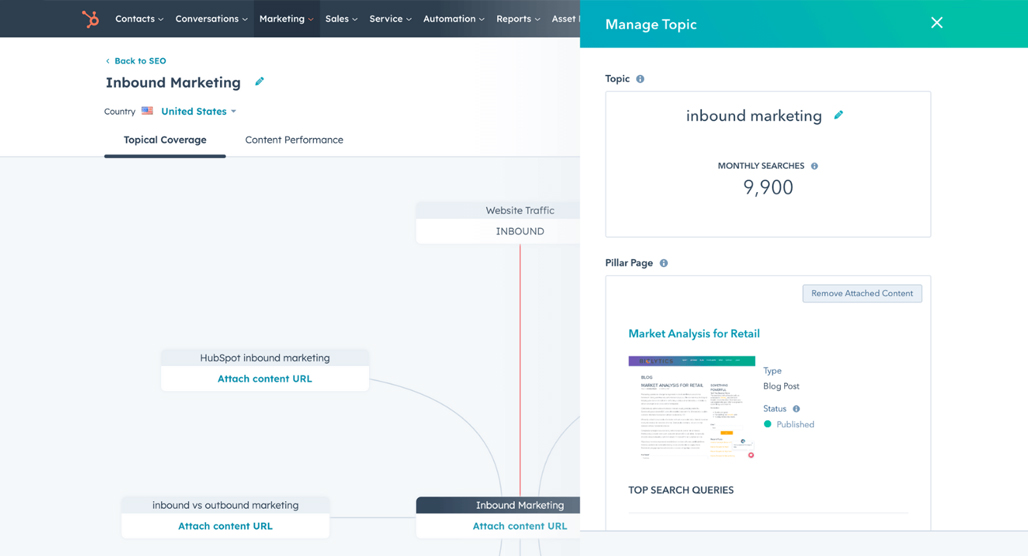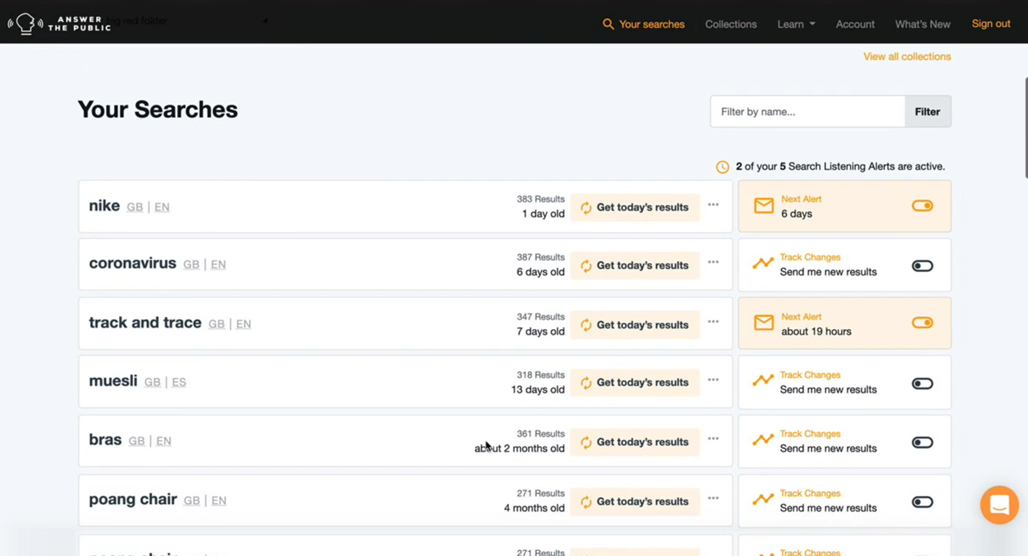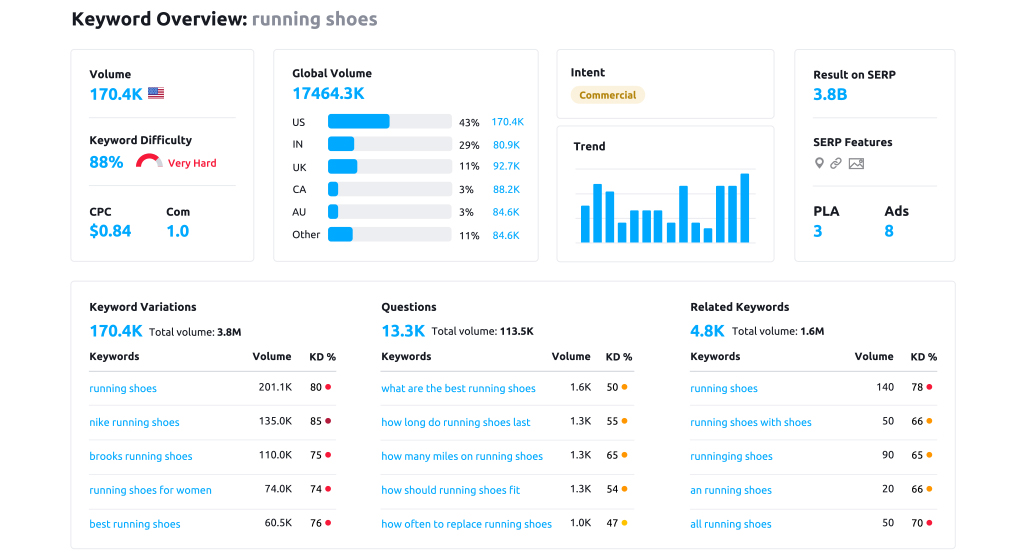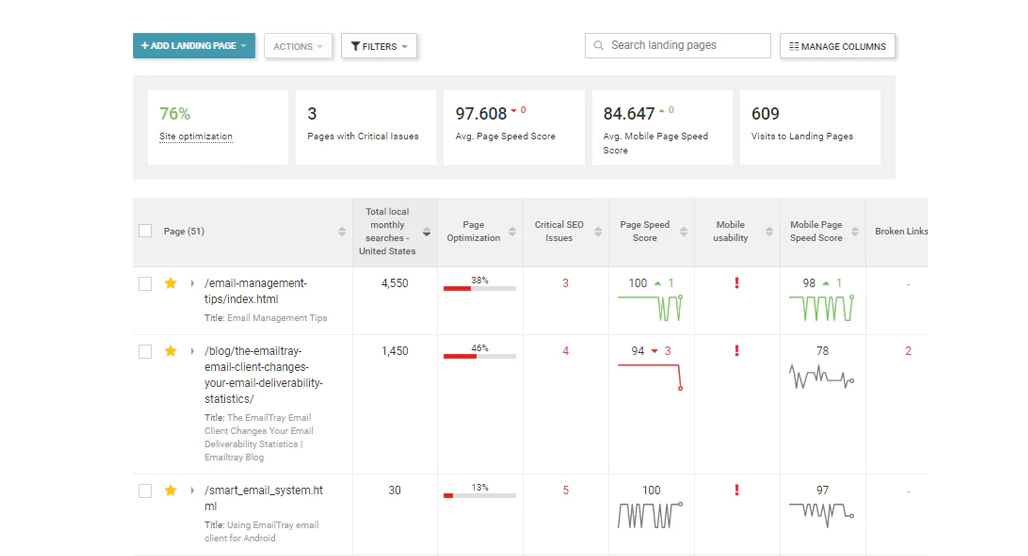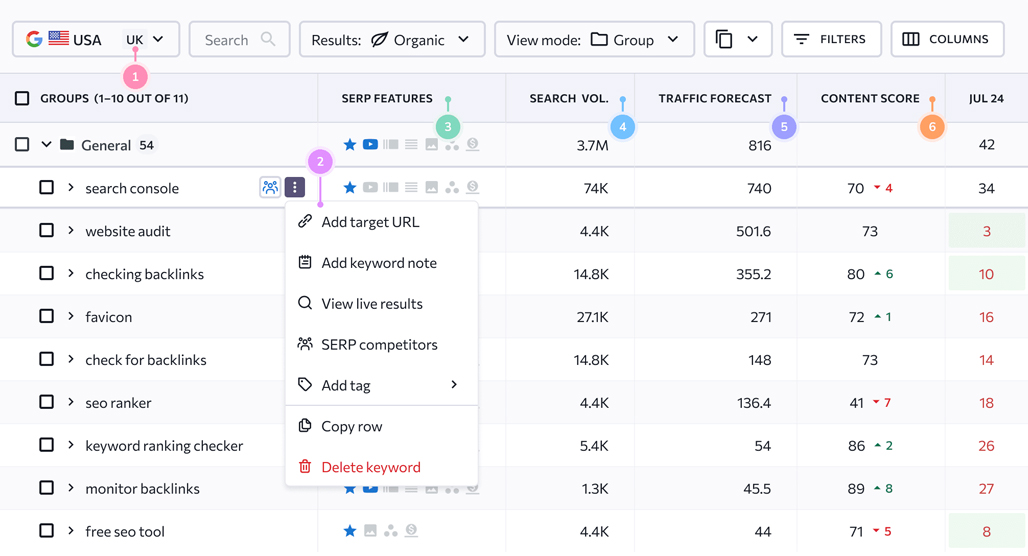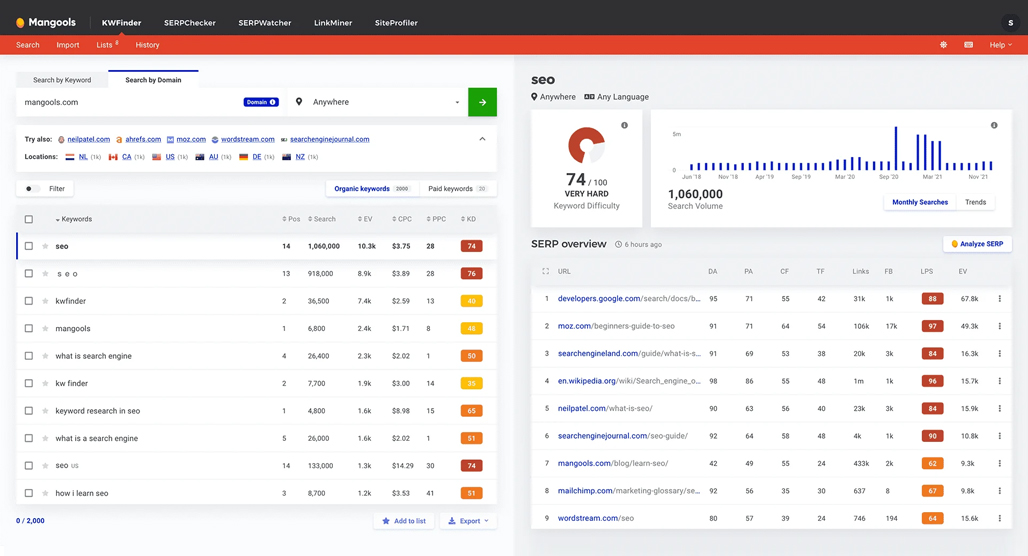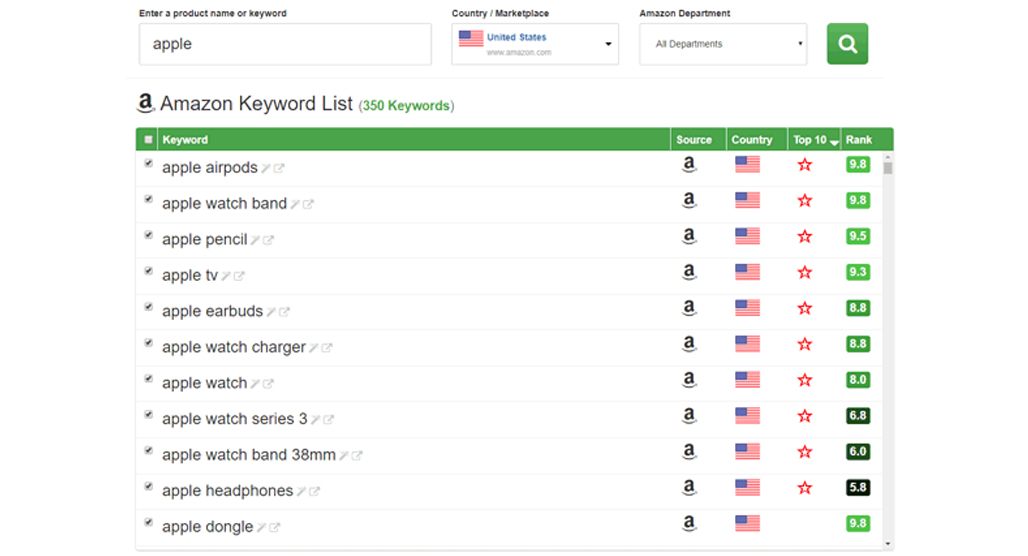11 Alternatives to Long Tail Pro: Find Easy to Rank Keywords

Long Tail Pro is a powerful platform for keyword research and management. With it, you can find long-tail keywords in bulk based on a core primary keyword, and you can evaluate those keywords for their difficulty, track your rankings for those keywords, and more. They have a lot of additional analytics, backlink monitoring, and other features as well. For $60 per month (for their cheapest starter plan) or up to $300 per month, it’s a powerful tool.
Many people like the platform, and I have to admit it does a lot of what you would want out of a keyword management platform. That said, the limited number of tracked keywords you get with the starter plan, combined with the price hikes over the years, have made it a less and less attractive platform for many bloggers and small businesses. At the same time, there are larger and more powerfully comprehensive tools available for enterprises with the budgets to spend, and competition is fierce for their business.
I’m not here to debate the merits of Long Tail Pro today. If you want to use it, great! Go right ahead. This post is for those of you who have decided you don’t want it for one reason or another. Maybe it’s too expensive. Maybe your workflow means you need more daily keywords and keyword tracking and less ongoing capacity. Maybe you just don’t really like how they format their dashboard, or you don’t think their metrics and keyword difficult rankings are accurate enough.
Whatever the case, you’re looking for alternative ways to find long-tail and easy-to-rank keywords. Luckily, we marketers are spoiled for choice; there are a ton of tools available, and the hard part is picking one. I’ve put together my top eleven suggestions for you to check out.
1: Topicfinder
Normally, I find it a little gauche to suggest your own service at the top of a list like this.
Normally, when I recommend myself, I put it at the bottom of a post. In this case, though, I think it’s warranted; Topicfinder is an incredible platform that I’ve developed as a tool for my own use, refined through years of operating a successful content marketing agency. I use it for my clients, and my clients are satisfied, so I decided to shine it up a bit for public use and make it available for all of you.
With Topicfinder, all you need to do is plug in your domain (and, optionally, the domain of a competitor). Once you have a couple of competitors plugged in, all you do is click a button, and thousands – tens of thousands – of real, usable topics are generated for you.
From there, you can export the whole list, or you can refine it. Advanced filters allow you to sort and prune the list based on metrics like the SEO viability score, domain authority, and even the size of the backlink profile of the sites currently ranking for those keywords. Tune this to best match your target area – a level of competition you can handle – and use your now-refined keyword list to boost your content marketing.
Best of all, I currently have a free trial offer available while I get the app launched and running. Give it a try!
2: HubSpot’s SEO Software
HubSpot is one of those brands that shows up on every list for an SEO or marketing tool anyone writes about because they’re so prominent, popular, and powerful.
If you looked at an app like Long Tail Pro or Topicfinder and thought, “This doesn’t do enough for me,” then HubSpot is the cream of the crop. Their interlinked set of platforms for marketing, content production and management, and site growth are all extremely powerful, and their ecosystem can handle pretty much everything you could ever want to do. It’s also capable of scaling with you from a small business to a major enterprise.
As you might imagine, the biggest drawbacks to a platform like HubSpot are the complexity and the price. HubSpot has a lot going on, and you’ll probably want to use features from a bunch of different modules, which means building a bundle of services. Those services each have starter packs at $20 per month, but if you need more capacity than they allow, you’ll need higher-tier packages with higher-tier pricing. A mid-sized business can easily find themselves facing a bill of $3,000 per month for mid-range services, and that’s without any of the onboarding, consulting, or API additional features.
3: Answer the Public
AtP used to be one of my favorite quirky examples of a powerful but niche tool on the internet. Their strange design with full-screen videos of people asking questions, combined with a very useful “real people asked these questions” engine, allowed you to find very targeted, very useful questions about specific topics that you could answer with your content marketing. It wasn’t about volume or about competition but about reality; this is what real people are asking from the internet, and it’s an opportunity for you to provide the answers.
Then Neil Patel bought it, removed the quirkiness, slapped his face on top, limited what you can do with a free plan, and added it to his portfolio of services.
It’s still fine, and it still works, but a lot of what made it really unique is gone. If you want a tool to automatically scrape Google for autocomplete suggestions based on question terms like “can” and “are” with your keyword, then AtP is a great option. Otherwise, you’ll want to pick a different tool.
4: Semrush
Semrush is, in my view, probably the single most useful tool I’ve ever paid for. It’s a comprehensive analysis platform that can check keywords, ranking, SEO values, site audits, content analyses, and a whole lot more based just on a keyword or a domain name. It’s not cheap – the least expensive option is $130 per month – but it’s well worth the price. Every penny I’ve put into it has come back in spades.
In particular, I find it very useful to use Semrush to analyze competitors. Once you know who you’re up against, you can figure out what their strategy is based on the keywords they use. Then, you can use tools like a gap analysis to find opportunities and topics they aren’t covering (or are covering poorly), and you can out-do them where they’re weakest. Then, as you grow, you can overtake them where they’re stronger until you step up to the next tier of competition and repeat the process.
For organic growth strategizing, I don’t think Semrush can really be beaten. You have to try it to see what I mean, though.
5: SEOMator
SEOMator is a platform with a variety of tools, including SEO auditing, rank tracking, backlink exploration, and keyword research. It’s that last one we’re most interested in, though. The most compelling part here is that the keyword research tool is free.
Just click the link above, plug in a keyword, and click the button. It will generate a table with related long-tail keywords, all with the associated estimated cost per click, the monthly search volume, and difficulty ranking for each keyword. Download them, use them, and repeat.
SEOMator also has a variety of other free tools if you need them. They can check your robots.txt validity, do a basic site audit for SEO metrics, check your backlinks, do a page crawl test, and a lot more. They also have an AI SEO Assistant, though it’s mostly just a chatbot that points you to one of their services.
6: SERanking
SERanking is a fairly comprehensive platform, though it’s more focused on things like rank tracking, competitive analysis, and site auditing over direct keyword research. Still, they have two keyword tools that can be pretty relevant.
The first is the keyword suggestion tool. This tool lets you plug in a domain and analyze your topics, identifying keywords you use, keywords you can use, and keywords others like you are using. They give you difficulty ratings, search volume sorting, and CPC analysis as well. It’s all fairly standard, if comprehensive.
The second tool is the keyword grouping or clustering tool. As we all know, it can be a little frustrating to use a tool to get keywords, be given 10,000 keywords, and find out that chunks of 20-100 at a time are all basically very long-tail versions of the same long-tail keyword and thus aren’t very useful. Keyword grouping helps you identify these related or overlapping keywords and work with keyword groups instead. It’s very handy, even if you’re used to doing it on your own, even implicitly.
7: Mangools KWFinder
Mangools is another of those overarching brands that offer a bunch of individually very useful tools, including the KWFinder, along with SERPChecker, SERPWatcher, LinkMiner, and SiteProfiler. They all pretty much do what they say on the tin.
KWFinder, in particular, is a very useful platform for finding and analyzing keywords based either on a core primary keyword or on a domain. You can find keywords, see who is ranking for those keywords, check the difficulty of those keywords, and see all the usual metrics – volume, CPC, PPC, expected value – in a nice handy chart. All in all, it’s pretty standard but slick and nicely linked with their other offerings.
8: Wincher
Wincher is primarily a keyword rank-tracking tool. That’s a feature that Long Tail Pro has, though it’s not their primary offering; Wincher makes it their main deal.
The world of SEO and content marketing is fast-moving, and competition can spring up a lot faster than you might imagine. Keeping track of your rankings, in general, can be pretty useful, both for knowing where you stand and for seeing when the competition around you is rising or falling. You can even use that information to then do gap analyses and other techniques to poach ideas from your competition.
Wincher does have a keyword suggestion tool built into their platform. It’s not as robust as dedicated tools, but it’s handy as a way to augment the rank tracking.
9: Juice
Juice is an AI-driven tool that I’m not quite sure I really recommend yet, but I know a lot of you are very keen on the most cutting-edge tools, so it might be worth trying out.
Here’s the thing: Juice isn’t a tool for doing your research; it’s a tool for having your research done for you. It’s also a tool for AI-generating content for you, managing your marketing for you, and basically going as hands-free with your site operations as you can.
For that reason, it’s very limited in who I would recommend it to. AI, at least in its current form as it relates to marketing, is a very tricky tool to use properly. The more people who use it, the more similar all of the results out there get, and the less useful it becomes for anyone using it. Get in early, use it to whatever effect you can, and don’t be surprised if it dries up almost overnight.
10: Keyword Tool Dominator
KTD is a fairly standard keyword research tool, like most of the rest on the list. I include it for one major reason: it’s not just limited to Google keywords.
While it does Google (and, by extension, Bing and other search engines), it also does a few different kinds of search. These include Amazon and Etsy, which come in handy for anyone looking to build e-commerce stores or product listing pages without building their own webshop. Many of you won’t need or want it, but for those of you who do, it’s an incredible advantage.
11: Wordtracker
Wordtracker is an oddly positioned keyword research platform these days. It used to be one of the best, but I feel like it has slipped a little behind the competition recently. They try to differentiate themselves by giving you a few unique ways to sort and group keywords, such as by finding keywords that may look good but have no-click results or by filtering them in a variety of ways.
On the other hand, they tend to have some really unusual and oddball results. For example, using a simple food-based search has a bunch of typical results but then also recommends keywords like “Dichlorodifluoromethane,” which is a now-banned CFC and isn’t really relevant to something like a food blog. Use with caution.
So, there you have it: almost a dozen useful options for keyword research. I’m sure there are more out there, so if you know of one you’d want to suggest, let me know! Tell me what it is and why it’s useful in comparison to the others up here on the list already. Or just use Topicfinder and forget about all the rest; that’s fine, too!
Leave a Comment
Fine-tuned for competitive creators
Topicfinder is designed by a content marketing agency that writes hundreds of longform articles every month and competes at the highest level. It’s tailor-built for competitive content teams, marketers, and businesses.
Get Started